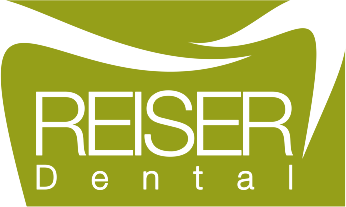Myofunctional Therapy in Denver, CO
Orofacial Myofunctional Therapy for the Mouth and Throat
Orofacial myofunctional therapy can improve your tongue position, which improves your breathing, speaking, chewing, swallowing, and facial posture. An abnormal tongue position can contribute to problems with your bite and speech, increase your risk of obstructive sleep apnea, and even affect how you look. Reiser Dental offers orofacial myofunctional therapy in Denver, CO for adult patients. Call us today to schedule a consultation to discuss whether you would benefit from myofunctional therapy.

What Is an Oral Myofunctional Disorder?
Oral myofunctional therapy is a treatment method for orofacial myofunctional disorders (OMDs). These disorders affect the facial muscles and interfere with the function of the mouth and tongue. OMDs are usually caused by poor nasal breathing habits or frequent oral breathing. This causes the muscles to adapt to a disordered breathing pattern. An OMD can also interfere with dental care and orthodontic treatments, rendering them less successful or effective.
What Is Myofunctional Therapy?
Oral myofunctional therapy (OMT) can correct the placement and function of the muscles in the throat, mouth, and face. Myofunctional therapy exercises can improve these muscles to make certain functions easier and less uncomfortable. OMT is simple, painless, and easy to do at home. The exercises your dentist or therapist teaches you will retrain your muscles to function properly and coordinate effectively with other muscles in the face, mouth, and tongue. You will need to commit to daily myofunctional therapy exercises for 6-12 months to see results. Your myofunctional therapist will work with your dentist or orthodontist to coordinate care and treatment and ensure your treatment plan is safe and effective. Our team takes a multidisciplinary approach to OMT. Consistent OMT can improve your eating, speaking, breathing, and sleeping, as well as your overall physical and mental health.
When and Why You Would Need Oral Myofunctional Therapy
Myofunctional therapy can address and improve OMDs that are affecting your physical, mental, and emotional health. If you have an OMD that is preventing you from sleeping, taking part in your hobbies, or spending time with family and friends, you may benefit from oral myofunctional therapy. Therapy can improve OMDs that directly or indirectly affect:
- Occlusion (bite).
- Temporomandibular joint movement.
- Speech.
- Chewing.
- Swallowing.
- Oral hygiene.
- Facial skeletal development.
- Breastfeeding.
- Facial appearance.
- Orthodontic treatment.
- And more.
You should consider myofunctional therapy if you have:
- A lisp.
- Difficulty articulating sounds.
- Temporomandibular joint dysfunction.
- Headaches.
- Airway obstruction.
- Obstructive sleep apnea.
- Frequent mouth breathing.
- Abnormal bite (malocclusion).
- Trouble biting, chewing, and swallowing food.
- Teeth that can’t erupt due to constant pressure from the tongue.
- Snoring.
What to Expect from Myofunctional Therapy Exercises
Your therapist or dentist will recommend one or more myofunctional therapy exercises for you to follow during your treatment period. The exercises you do will address your specific symptoms and their cause, whether it is poor habits or a structural or physiological abnormality. OMT exercises might include:
Breathing exercises are breathing re-education. Your therapist or dentist will walk you through simple, easy-to-follow breathing exercises to help you get into the habit of nasal breathing instead of mouth breathing. This approach accelerates the ability to breathe through the nose while awake and sleeping comfortably.
These exercises improve the strength and position of the tongue and the coordination of the tongue, mouth, and throat muscles. An example is holding the tip of your tongue behind your top teeth for a period of time.
If you have trouble breathing through your nose or have improper resting mouth posture, these exercises can help. The goal is to help you keep your lips together when you aren’t speaking, eating, or drinking. An example is holding a tongue depressor vertically between the lips for a period of time to improve the coordination and strength of the lips.
If an OMD affects your speech, you may have trouble making ‘s,’ ‘z,’ or ‘sh’ sounds. A speech therapist can improve your tongue’s resting position so that it’s easier to speak.
If you have trouble swallowing, your therapist can recommend changes to your diet and the tools you use to eat and drink to improve your tongue strength and positioning.
Why Choose Reiser Dental
At Reiser Dental, we prioritize developing strong, trusting relationships with our patients. We offer gentle, effective, personalized care in a comfortable, welcoming environment. We have extensive experience helping patients overcome dental fear and anxiety to get the care and treatment they need to stay healthy. Everyone in our community should have access to safe, reliable dental care, so we do our best to keep our prices reasonable. We take most major dental insurance plans and will help you coordinate with your insurance company for coverage. We are also committed to patient education, and we want our patients to be able to make informed decisions about their dental care. Each member of our team stays on top of the latest research, advancements, and technology in the industry to ensure we’re always giving our patients the safest and most effective care and the most up-to-date information. We specialize in general dentistry, cosmetic dentistry, TMJ treatment, night guards, pediatric dentistry, orthodontics, endodontics, root canal therapy, prosthodontics, full-mouth reconstruction, teeth whitening, Invisalign treatment, and more.
Schedule a Consultation for Myofunctional Therapy
Call us today or contact us online to schedule a consultation for myofunctional therapy in Denver, CO. We will work closely with you to assess your oral and dental health, identify any underlying OMDs or symptoms of OMDs, and design a personalized treatment plan that improves your overall health.
